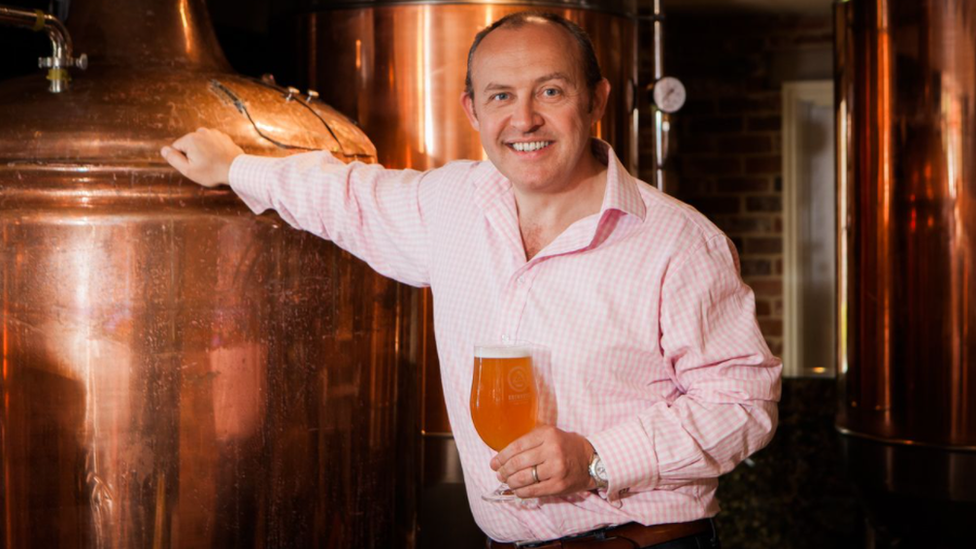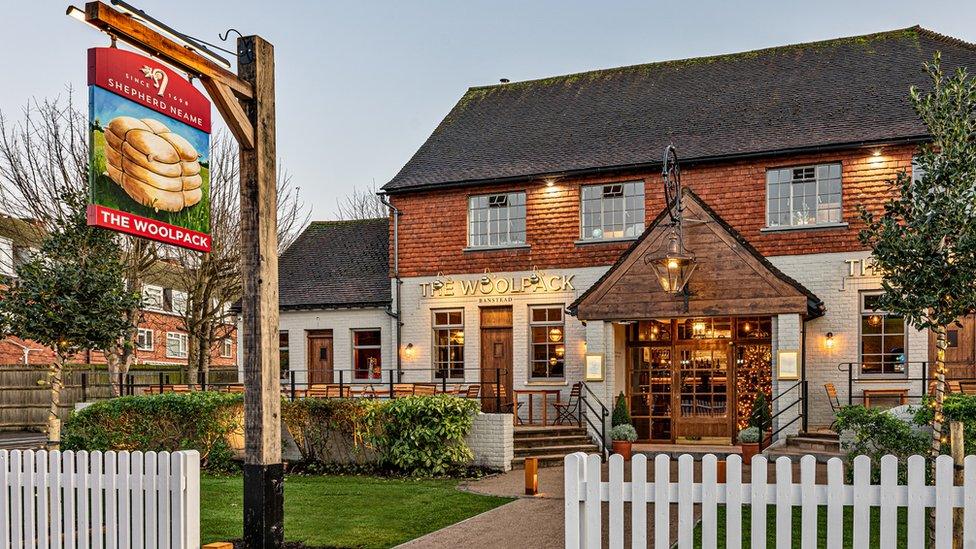Takeaway beer sales 'will make a significant difference'
- Published
- comments

Kris Gumbrell,, who runs 22-pub chain Brewhouse & Kitchen, says the shift is 'a tremendous result'
A government U-turn allowing pubs to sell takeaway beer during the latest lockdown has been broadly welcomed by the industry, but some chains say they will still struggle to survive.
Kris Gumbrell, chief executive officer of 22-pub chain Brewhouse & Kitchen, said it was "a tremendous result".
"I think it will make a significant difference, not only for my company, but for the entire sector", he told Radio 4's Today Programme.
During the first lockdown, a lot of pubs served takeaway meals and drinks as another revenue stream, which was "essential", he said.
"What we noticed is that businesses evolve through a crisis, and also the guest evolves through a crisis as well. People miss pubs, they miss the connection, they miss the community part of what a pub actually means, so they want to support their local pub," he said.
"Giving a pub the opportunity to open up a new revenue stream was really critical in helping to pay those bills," he said.

Mark Newcombe says: "Our income will be reduced to nothing."
However, Mark Newcombe, head of a community-run pub called the Craufurd Arms, in Maidenhead, says his pub will still have to close for the duration.
Under the new restrictions, customers must order their drink via a website, phone or text message. Deliveries are also allowed.
Pre-ordered alcohol can be collected by customers as long as they do not enter the premises, the legislation says.
Mr Newcombe's pub stayed open when the first lockdown rules were eased because it was able to serve takeaway real ale on the spot.
But this time it will close for the second one because his pub doesn't have an app, and is "not in the position to run a [pre-ordered] takeaway service," he said.
To keep its head above water, the pub will furlough staff, apply for local government grants, launch a crowdfunding campaign, and perhaps sell more shares in the venture.
As for the pub's longer-term future, he said it was "very difficult to plan" as he didn't know when it would be able to reopen.
"At the end of the day our income will be reduced to nothing," he said.
But Mr Newcombe was also concerned about the wider implications of shutting the pub on the local community, particularly on the mental health of people adjusting to a second lockdown who may use the pub for social interactions.
The new restrictions "take away that social engagement", he said.
Plans published at the weekend originally suggested that while restaurants could sell takeaway food, takeaway alcohol was to be banned.
The industry has hailed the turnaround as a small victory but said the rules should allow venues to sell drink in the same way as an off-licence.
"Takeaway alcohol from pubs if it is pre-ordered and customers don't enter the premises is movement, but still not anywhere near enough," said Emma McClarkin, chief executive of the British Beer & Pub Association.
"Supermarkets and off-licences can still sell alcohol, so this is grossly unfair on pubs with off-licences. It remains the case that to help pubs and brewers survive, and to stop up to 7.5 million pints from being wasted, the government needs to give pubs the same ability to sell off-licence alcohol as it did in the first lockdown."
'Common sense'
In the last lockdown, pubs in England had been allowed to sell takeaway pints and food, and were concerned that closure for a month would mean pouring millions of pints of ale down the drain as open kegs would go off.
"It is a welcome and helpful clarification that pubs and restaurants will be permitted to continue with off-licence sales of alcohol through delivery, as well as click and collect for pre-ordered sales," said Kate Nichols of lobby group UK Hospitality.
"This was a lifeline to many businesses in the first lockdown and it is good to see common sense prevail this time too - avoiding waste and providing a valuable community service - although we can see no reason why a pub could not operate as a retail outlet for pre-packaged food and drink as many did last time."
A government spokesperson said: "We recognise that these are extremely challenging circumstances for pubs and the hospitality industry. Public health and safety remains our number one priority and that is why pubs and other hospitality venues cannot serve alcohol on site to takeaway to prevent people from gathering outside their premises.
"However, they can sell alcohol as part of delivery services, including through click and collect, over the telephone and by other remote methods of ordering for collection, provided customers do not congregate as groups once they have picked up their order."
- Published2 November 2020

- Published1 November 2020
